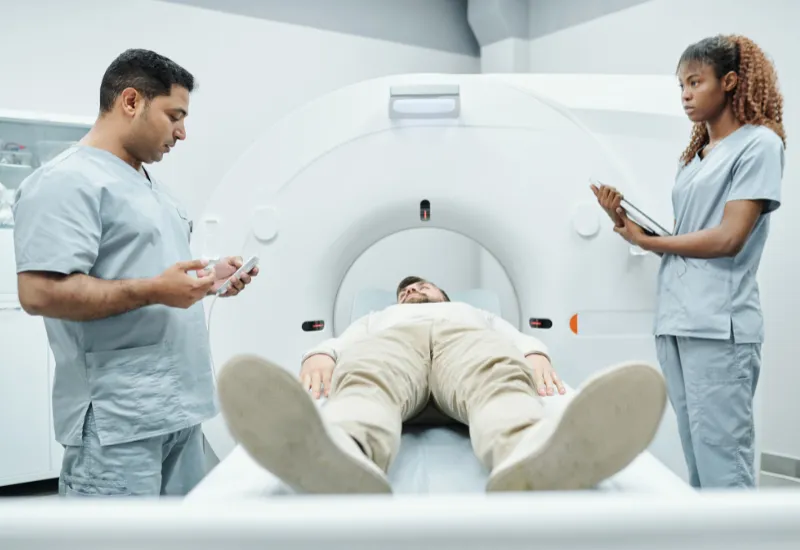What is a Brain PET scan?
A brain PET, or positron emission tomography, the scan is an imaging exam that allows doctors to see how your brain functions. The scan captures images of the brain's activity after radioactive "tracers" have been absorbed into the bloodstream. The highlighted parts of the brain seen under a PET scanner enable doctors to see how the brain functions and detect any abnormalities.
A brain PET allows doctors to precisely observe the function, size, and shape of the brain. Unlike other imaging exams, these allow a view of the brain's structure and how it's functioning. Brain PET scans allow doctors to diagnose many diseases like dementia and Alzheimer's. It can catch these and other diseases like cancerous growths, Parkinson's, and epilepsy in their early stages. If you are undergoing treatment for a brain disorder, your physician may order cranial PET scans regularly to monitor the success of the treatment.
Brain PET Scans and Dementia
One of the diseases that PET scans are performed to diagnose and treat is dementia. Dementia is an umbrella term for disorders that impair remembering, thinking, or making decisions regarding everyday activities. Dementia is not a normal part of aging, but it is increasingly common. One in six people over 80 are now affected by dementia. There were estimated to be 5 million adult dementia patients in 2014, and this number is projected to reach 14 million by 2060.
Dementia is a general term, so its signs and symptoms can vary vastly from patient to patient. Usual symptoms of dementia include problems with memory, attention, communication, judgment, reasoning, and problem-solving. It can also include mood swings and impaired vision due to age.
Some signs of dementia can include getting lost in familiar areas, the inability to do basic tasks independently, and forgetting the names of close family members and friends.
Brain PET Scans and Alzheimer's
A type of dementia that PET scans are used to diagnose is Alzheimer's disease. Alzheimer's is an escalating neurological disorder that presents itself similarly to most kinds of dementia. Alzheimer's is the prevailing cause of dementia (around 65%) and causes the brain to atrophy or shrink in size, killing brain cells. This shrinking leads to a progressing decline in brain function like thinking, behavioral and social skills that affect your ability to function individually.
Alzheimer's affects around 6 million people in the United States who are over the age of 65. Out of these, 80% are over the age of 75. The symptoms and early warning signs of Alzheimer's are general forgetfulness and forgetting critical recent events, people, and conversations. As Alzheimer's progresses, patients, develop a severe level of memory impairment and lose the ability to carry out everyday tasks.
How PET Scans Can Be Used In Diagnosis of Dementia and Alzheimer's
PET scans of the brain can detect changes in brain size and activity relating to dementia and Alzheimer's disease. PET scanning has improved the diagnosis and medical care of people with dementia and similar symptoms.
Diagnosing dementia, especially early on in the disease, can be challenging for many physicians. It can be challenging to deal with patients, especially when they experience a significant decline in cognitive function before their dementia is detectable with routine testing methods.
Diagnosing Dementia With PET Scans
PET scans can diagnose dementia in patients by monitoring the changes in glucose metabolism in the brain. Glucose metabolism is altered in dementia, and this can be visualized by FDG-PET imaging. Differences in reduced glucose metabolism can help narrow down different types of dementia. FDG-PET can also be used to detect brain changes caused by dementia before symptoms even show up.
Diagnosing Alzheimer's With PET Scans
Alzheimer's can be diagnosed through PET scans by observing beta-amyloid plaque deposits found in the brain. The procedure uses a specific radioactive tracer that joins with amyloid deposits in the brain and can be visualized through PET scan images. Patients with dementia and Alzheimers have more amyloid deposits in specific brain areas than those without. Doctors can also use this imaging exam to detect early brain changes due to Alzheimer's before symptoms become apparent.
Difference Between MRI and PET for Dementia and Alzheimer's Diagnosis
Many patients bring up the question of the difference between MRI and PET scans for detecting Alzheimer's. Both have their pros and cons, and the difference between MRI and PET scans is that MRIs obtain a very high-resolution image of the brain's structure. Since the brain's hippocampus region characteristically atrophies or shrinks when afflicted with Alzheimer's, MRIs are used to diagnose this disease. On the other hand, PET scans use radioactive tracers to show specific parts of the brain and evaluate brain function.
The Cost of A Brain PET Scan
According to collected data, a cranial PET scan can be very costly. A PET ordered to investigate dementia and Alzheimer's symptoms performed in the United States can cost around $3000 to $5000 in public healthcare facilities. This number is even higher for private insurers.












